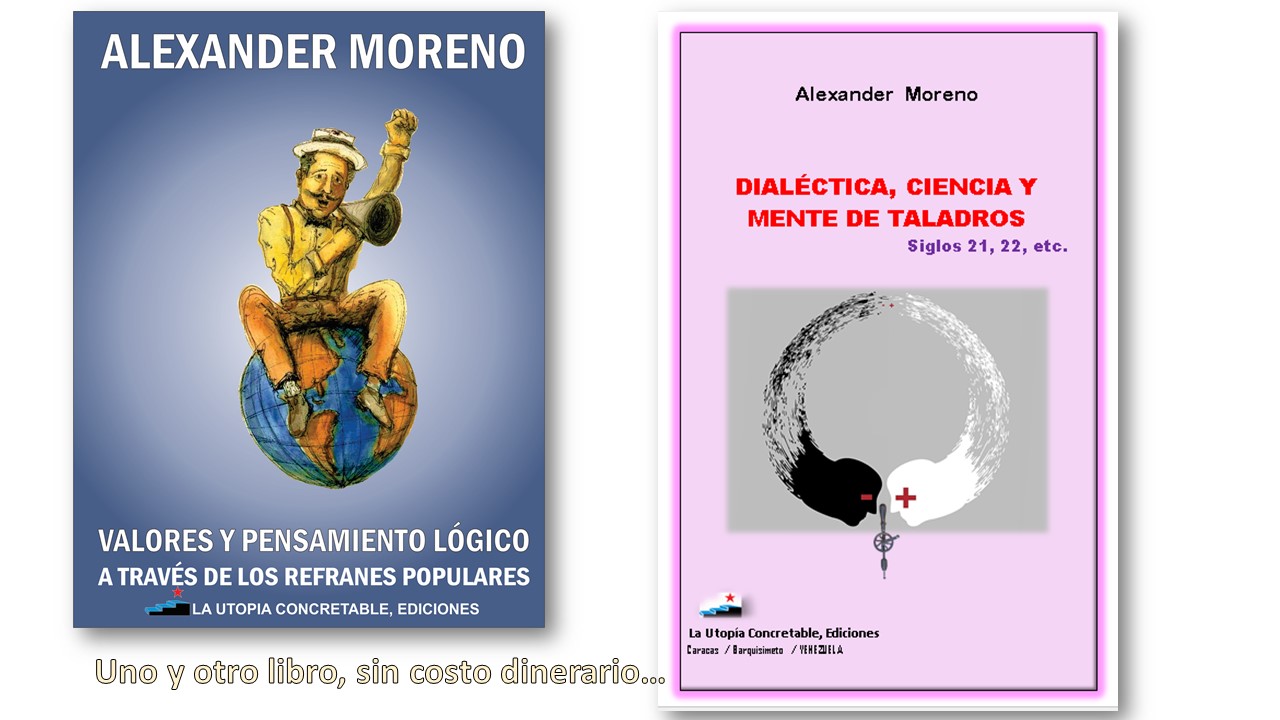No siempre LO CONTRADICTORIO resulta INCOHERENTE (en la ciencia y en la vida) / THE CONTRADICTORY is not always INCOHERENT (in science and in life)

Si las cosas y los razonamientos no transitaran por contradicciones internas y externas, entonces jamás cambiarían; serían permanentes, estáticas y esto último no tiene sentido. Sin embargo cuando la tradición vulgar y académica asume la noción de LÓGICA, acude al trillado principio de la no-contradicción y lo que es peor, penaliza lo contradictorio. ¡Qué va! En este post nos oponemos a eso. Accedan (que es frontal y conciso)...
If things and reasoning did not go through internal and external contradictions, then they would never change; they would be permanent, static, and the latter makes no sense. However, when the vulgar and academic tradition assumes the notion of LOGIC, it goes to the hackneyed principle of non-contradiction and what is worse, it penalizes the contradictory. No way! In this post we oppose that. Accede (which is frontal and concise) ...
One of the greatest mysteries that exists in almost all the instructional systems of the world, has to do with the reason for the simplification that is observed in the teaching-learning processes in the matter of logic. This is not only in primary and secondary school, but also in the university stage (including postgraduate levels!). It turns out that when any consideration is made to the logical subject, then "as if by magic" they go to the construction and development of school programs that place absolutely all their eggs in the only basket of what they indiscriminately call "formal logic", "analytical logic", "Aristotelian logic", etc .; that is to say, that model of organization of thought focused on the notion that a thing (or an idea) cannot be at the same time and circumstance, itself and its opposite (principle of non-contradiction) and, together with it , that that thing (or that idea) is identical to itself and nothing else! (principles of identity and of the excluded third). I must say that the students of these subjects often tell me that what they resemble to a greater degree is mathematics. It is that both those of mathematics and those of logic are usually "condemned" to a work full of chiaroscuro in the legitimate, anguished and willful search for the object and the meaning of what they study.
I must say that when I was 19 years old and was studying (1966) a university degree in an Ibero-American study house [which today, by the way, has 300 years of existence (1)] and I had to take the logical subject , the book that the professor assigned was entitled "Introduction to Logic"; the author: Irving Copi (American philosopher, 1917/2002). Respectable author and respectable bibliographic piece. I remember, however, that there was a generalized view among colleagues at the time, that except for the chapter called "Fallacies", the book (and the subject in general) offered us little relevant learning as to what with naivety and the youthful spontaneity of the case we called "a logic for real life." I must add that this chapter of "Fallacies", as we know, proposed a classification of those arguments about x, ye or zeta social situation which had a face of logically correct, but deep down they carried with them a trap, a fiasco, a logical invalidity. At the end of this post, I attach a link that can lead to a material on this topic of fallacies, which I published attentively on this Hive network a long time ago (2). I remember an acute example that Copi brought up ... He gave an account of a young man who had committed homicide to the detriment of one of his parents and when he later argued before the judge that he was conducting such an abominable case, the deranged boy asked with unusual passion that they have clemency with him given his condition as an orphan ...
I reiterate ... Except for that chapter of the fallacies, it was not much that that subject and that book (3), offered us to the avid students of those hot years' 60s. Ah ... but it causes me supreme concern that more than half a century after this circumstance, the same instructional programs and Copi-style books continue in the classrooms.
Then, according to the aforementioned version, it is assumed as "correct" in terms of logic and the teaching of logic, that all reasoning that to some degree violates both the principle of non-contradiction and the principle of identity, is unfailingly nonsense (all of which conforms to the principle of the third excluded); and this is how the unhappy advice that "every contradiction goes against correct thinking" takes shape ... That "every contradiction goes against logic".

I confess that up to now I have not done significant (and comparative) studies on the preparation that the curricula of the careers and postgraduate degrees in Law, Criminology, Criminalistics and other studies on Security draw up in the curricular line of logic. Without embarrassment I admit such insufficiency and I also admit that I prejudge that the tragedy of seeing the matter in question with the aforementioned fogged "logic glasses" is there. How common is it to see these professionals considering as nonsense, supporting arguments of contradiction even carrying these reasonings, significant contents both of objectivity and of correct cognitive ordering! It must also be said that when these professionals adequately show themselves in their criteria and judgments, elements such as "mitigating", "aggravating", "situation of deep pain", etc., correct senses also appear (and sometimes are installed) and logicians of the dialectical principle of contradiction.
Of course ... Not every contradiction embodies a logical sense, a correctly dialectical sense; no. There are (and many!) Contradictions that not only deserve to be condemned at the point of the logical-analytical principle of the excluded third, but there are contradictions that have little to do with the dialectical meaning of the contradiction. There are also contradictions that have nothing to do with the dialectical meaning of the contradiction. Ah, but in every reflection and in everything that exists, contradictions dwell in its respective bosom that push to invert the state of reflection, good of the thing. That struggle means that change is inevitable at some point and under some circumstance.
BELOW I ALLOW ME TO ADD TWO ELEMENTS HERE. THE FIRST ONE IS A LIST OF POPULAR SAYINGS THAT ATTRIBUTE THE RATIONALITY OF THE CONTRADICTION. THESE ADAGES APPEAR IN MY BOOK "VALUES AND LOGICAL THOUGHT THROUGH POPULAR SAYINGS" (AVAILABLE FREE ON THE INTERNET). THE SECOND ELEMENT THAT I WRITE DOWN HERE IS A VERY SPECIAL INVITATION FOR YOU TO ACCESS (ALSO FREE OF CHARGE) TO A BOOK ALSO BY MY AUTHORITY AND THAT HUGS IN A SPECIAL WAY THE SUBJECT OF THE CONTRADICTION AND OF, IN GENERAL, DIALECTIC THOUGHT. IT IS TITLED "DIALECTICS, SCIENCE AND THE MIND OF DRILLS."
“Aquí hay que dormir con un ojo cerrado y otro abierto”.
“Mucha bomba y poco chicle”.
“Hoy los venados corren detrás de los perros”.
“Cara seria, sexo juguetón”.
“Despacio, que ando deprisa”.
“El que compra cosas que no necesita, después vende las que necesita”.
“De lejos te escribo; de cerca ni te llamo”.
“Luz de la calle, oscuridad de la casa”.
“Va para el cielo, y va llorando”.
“No hay un libro malo que no tenga algo bueno”.
“¡A padre ahorrador, hijo gastador”.
“Dios los cría y el diablo los junta”.
“Después de tanto nadar, venir a ahogarse a la orilla”.
Lo alabado es cagado”.
“En boca dulce, tripas amargas”.
Otros:
-“Ayer penaba por verte; hoy peno porque te vi”
-“El engaño destruye más al engañador que al engañado”.
-“No hay alegría sin tristeza”.
-“Nadie es profeta en su tierra”.
-“Todo lo que da placer, es inmoral, es ilegal o engorda”.
-“Donde fastidio, amanezco”.
-“Todo grandulón es cobarde”.
-“Lo barato cuesta caro”.
-“Quien dice lo que quiere, oye lo que no quiere”.
-“Después de puta maldita, hábito de Santa Rita”.
"In bad weather, good face."
"Here you have to sleep with one eye closed and the other open."
“A lot of pump and little gum”.
"Today the deer are running after the dogs."
“Serious face, playful sex”.
"Slowly, I'm fast".
"He who buys things he does not need, then sells what he needs."
“From afar I write to you; I won't even call you up close ”.
"Light in the street, darkness in the house."
“He goes to heaven, and he goes crying”.
"There is not a bad book that does not have something good."
“A saving father, spending son”.
"God raises them and the devil brings them together."
"After so much swimming, come to drown on the shore."
What is praised is shit ”.
"In the sweet mouth, bitter guts".
Others:- “Yesterday I was sorry to see you; today I'm sorry because I saw you "- "Deception destroys the deceiver more than the deceived."- "There is no joy without sadness."-"Nobody is a prophet in their own land".- "Everything that gives pleasure, is immoral, illegal or fattening."- "Where I annoy, I wake up."- "Every big man is a coward."- "Cheap is expensive."- "Who says what he wants, hears what he does not want."- "After you fucking whore, Santa Rita's habit."
WE SAY HERE THAT DIALECTIC REASON IS TALADRAL given that in its internal tissue there are general knowledge about reality (nature and social relations) and hominity (thought, language, emotionality and conformation of individuality) prevailing in the fabric of these ideas , on the one hand, the consideration of the material, contradictory and changing nature of the aforementioned objects, and on the other hand, the disposition to discard the vocation that they possess to establish chiaroscuro between the respective essences and appearances. Dialectical reason is thus a worldview (that is, a generalist approach) that rewards the material, the contradictory and the dynamic; This is not as a strictly scientific method (which would lead to work on specific objects), but rather as an enlightening philosophical method which just appreciates and assumes those features that all real and hominal objects possess, in order to achieve expositions pregnant with complex logical arrangements. and drills.
Alexander Moreno. Caracas / Barquisimeto, Venezuela.
Dialectical thought, seen in this way the matter, is a way of assuming both what is permeated with the academic and what is linked to daily life itself, at the point of courage, of conscience for the fight, of opposition to everything that smells of concealment, to injustice, to conformity. We know that the word "dialectic" has been associated with the unsuccessful Soviet experience and others linked to it, thus ignoring that the signifier in reference comes from centuries and previous centuries and according to various modalities here and beyond the strictly political, state . Even so, nothing can go against the contradictory and dynamic character of both natural and socio-relational reality as well as the human. Nor can anything go against the supreme need that every student has, to unveil the zigzagging manifestations of truth and deception that these objects (real and human) possess, and consequently unleash the struggles leading to new situations and, above all , human-centric. As a reference to this topic of dialectics, we attach some knowledge about science ... What we could see as its general characteristics, its contextual objects, its "sworn enemies", in short. Given this, we make some emphasis on issues that traditional epistemological literature sees with extreme myopia, such as the language-thought-emotionality unit, the objective process of shaping human individuality ... We also attach some notes on the dialectical method (especially in the social science). We are not intimidated by criticism; we love her dialectically ...
Alexander Moreno. Caracas / Barquisimeto, Venezuela.

LOS ENLACES:

The Central University of Venezuela, in Caracas. Its headquarters were decreed in 2000 by UNESCO, "World, Cultural and Natural Heritage of Humanity".
There were also others of a similar cut, such as those of the respectable authors Gregorio Fingermann, R. Harré, Juan José Sanguineti ...
https://pixabay.com/es/photos/hombre-dolor-de-cabeza-frustraci%c3%b3n-5531026/ https://pixabay.com/es/illustrations/mujer-confundido-expresi%c3%b3n-facial-6104448/ https://pixabay.com/es/illustrations/pensar-pensando-pregunta-ocurrencia-6327240/ https://pixabay.com/es/vectors/justicia-ley-tribunal-juez-juicio-6570152/
Su post ha sido valorado por @ramonycajal
Vuestro apoyo es un estímulo a nuestra producción intelectual. Mil gracias.